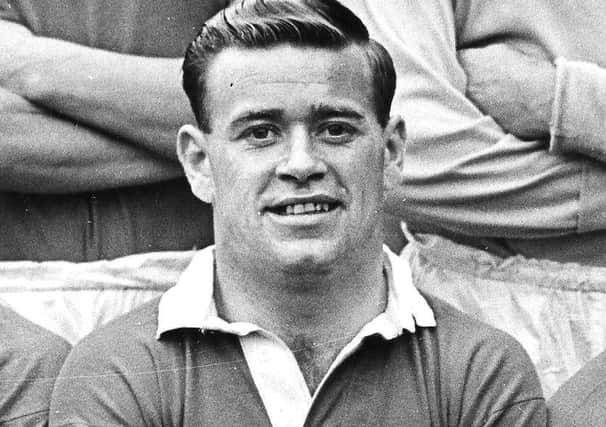Obituary: John Cohen Coyle


Johnny Coyle, who has died in his 84th year, was, for a short period in the 1950s, the most-prolific goal-scorer in Scottish football.
His ability to convert chances took him, from Second Division obscurity with Dundee United, to Scottish Cup glory with Clyde and to the verge of the Scotland team, before, as quickly as it arrived his goal-scoring streak ended.
Advertisement
Hide AdAdvertisement
Hide AdAt the height of his “hot” streak in 1958, he scored a Scottish Cup-winning goal, albeit with the help of a wicked deflection off John Baxterm as Clyde beat Hibs 1-0 at Hampden. That goal, one of 31 he scored in half a season for Clyde, for whom he signed, from Dundee United for £8000 in December, 1957, helped propel the Dundonian into the 22-man Scotland squad which travelled to Sweden for the World Cup Finals.
Today, an uncapped player would surely be blooded in a World Cup warm-up game. Scotland, but Coyle, given the squad number 18, travelled to Poland, then on to Sweden, to sit in the stand through four games, during which Scotland’s lack of a goal-scoring centre forward was exposed, and frequently pointed out by the travelling press. The “fans with typewriters” championed his cause, but, not even Dawson Walker, his club trainer and acting team manager for Scotland, could persuade the selectors, who picked the side, to give him his chance. He never did win a cap. Uniquely, he went to a World Cup Finals with Scotland, but, never wore dark blue at any international level.
Within two years of that World Cup, his scoring streak had ended, he was released by Clyde and forced to take his talent into the English non-league scene.
Dundee born and bred, he caught the eye of Dundee United with junior side Dundee St Joseph’s and he signed for the Tannadice club, then languishing in Division B, the second tier of Scottish senior football and very definitely the poor relations in Tannadice Street in 1950. In all, United signed five St Joseph’s players, Jimmy Coyle, Johnny’s brother, Jimmy Reid, Johnny, Dave Sturrock and Maurice Milne. Indeed the quintet would go on to occasionally form the United front line together.
However, it took Johnny some five years to break through. Certainly, two of these years were spent on National Service, while there was a spell on-loan to Brechin City. However, once he got into the first team on a regular basis, the goals flowed – 43 in as many games in 1955-56. In all, hew would go on to score 112 goals in 132 first-team appearances for United.
But, faster than he could score goals, the porous United rearguard conceded them as the club languished in Division B mid-table. However, his scoring prowess had been noticed, and, in December, 1957, came that move to Clyde, and that half-season haul of 31 goals – including a Scottish Cup semi-final hat-trick against Motherwell and a brace in what was only Clyde’s third ever Glasgow Charity Cup win, over Rangers - which propelled him into the Scotland squad.
Archie Robertson, who with Coyle and Harry Haddock had formed a three-man Clyde playing delegation in Sweden, was the club’s top-scorer in 1957-58, but, with a full season to play in 1958-59, Coyle led the club’s scoring, however, as season 1959-60 unfolded, his star waned and at the end of that season he left the club, for Cambridge City, having scored 59 goals in 85 games. In all, during his senior career in Scotland, he scored at the rate of 0.7 goals per game, well above the 0.5 gpg which is the benchmark for an internaitonal-class striker.
In truth, his move to Cambridge was not a success. He never established himself as first-choice centre forward for the club, for whom he had two spells, interrupted by a season with Boston United. But, he continued to find the net regularly in the reserves, before hanging up his boots.
Advertisement
Hide AdAdvertisement
Hide AdHe continued to live and work in Cambridge, where he died last month. His final years were blighted by the death of his wife Margaret and by the curse of so-many footballers of his generation, Alzheimer’s. Johnny Coyle is survived by his children: June, John Jr., Graham, Sally and Melanie, ten grand-children and 20 great-grand-children.
MATTHEW VALLANCE